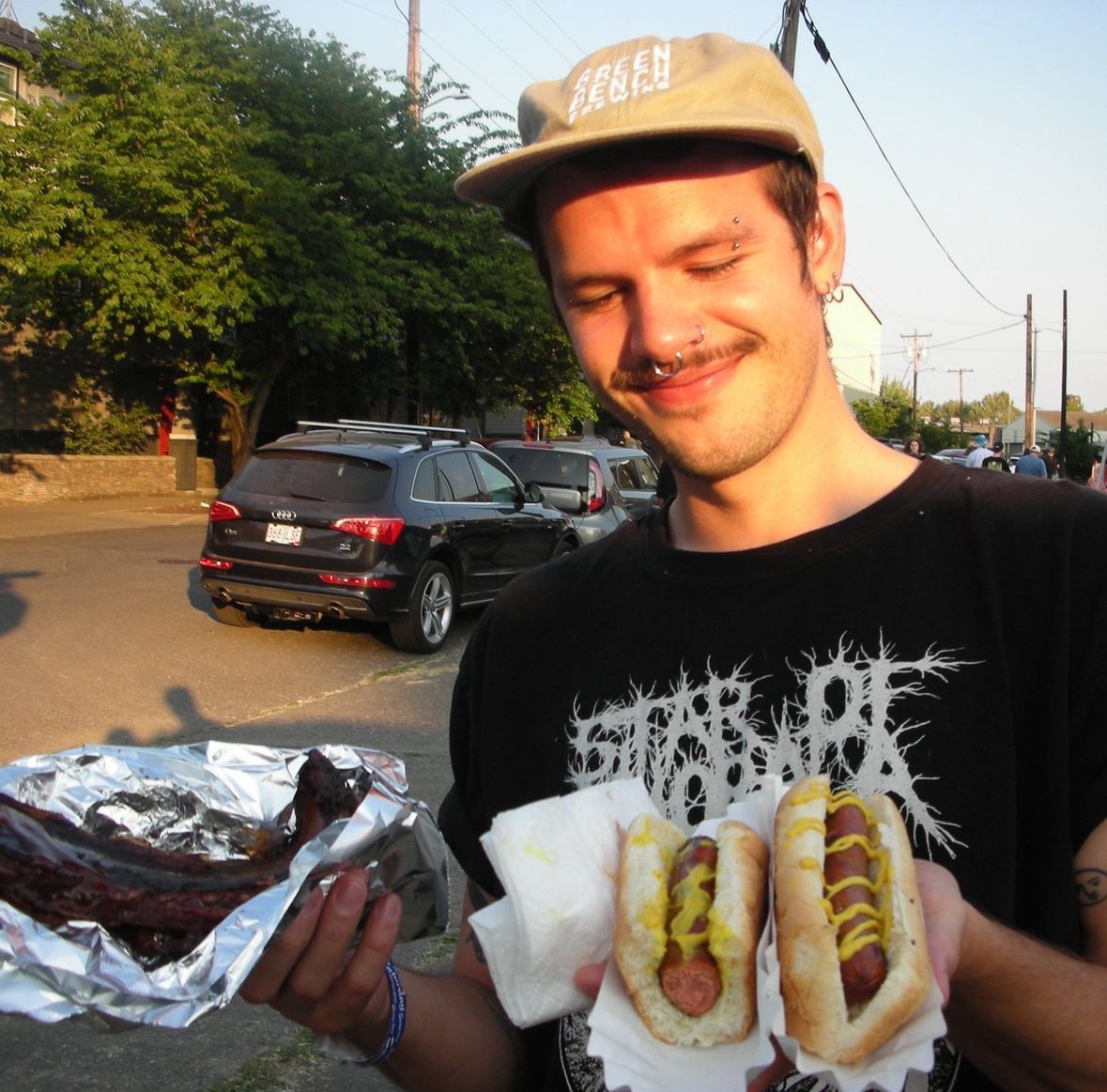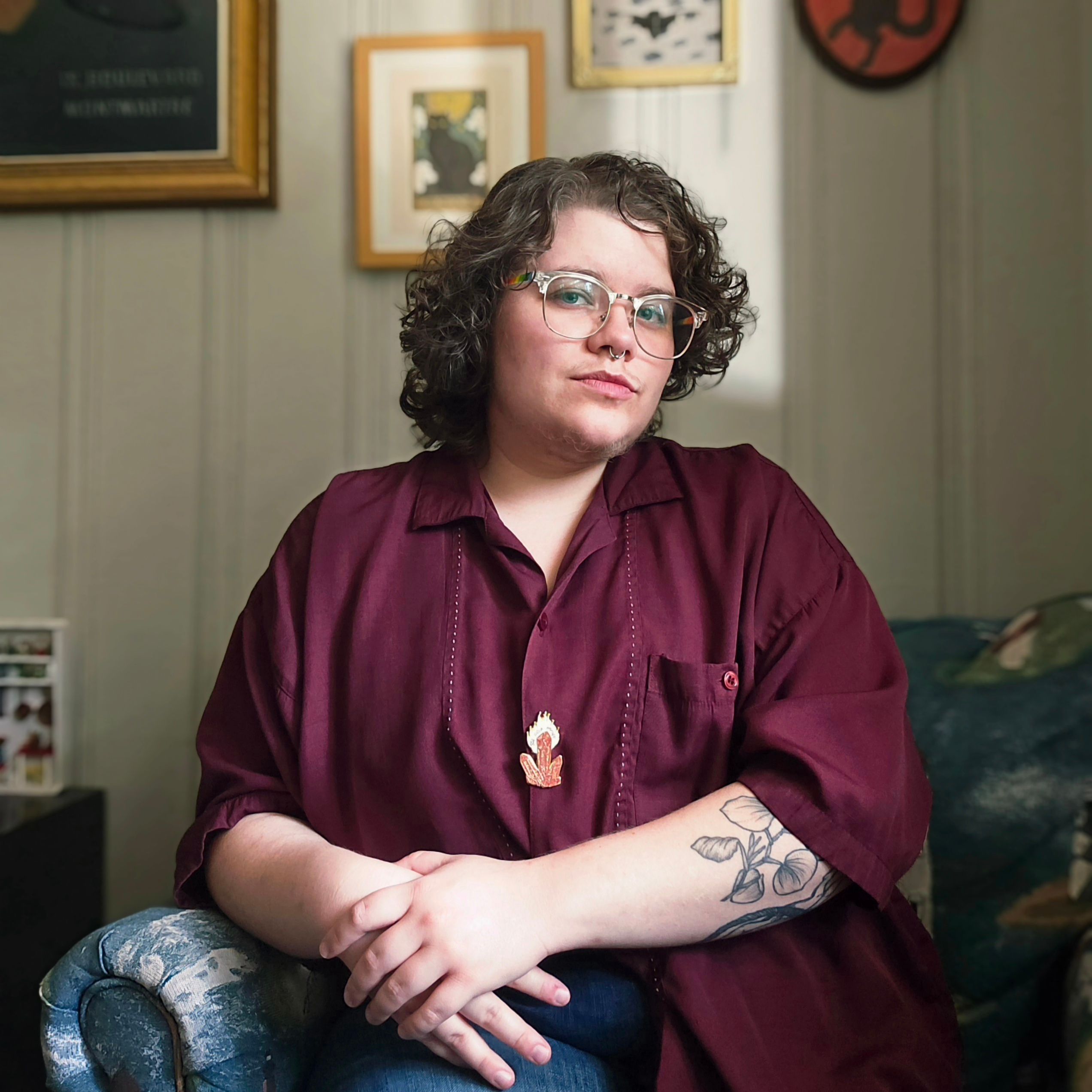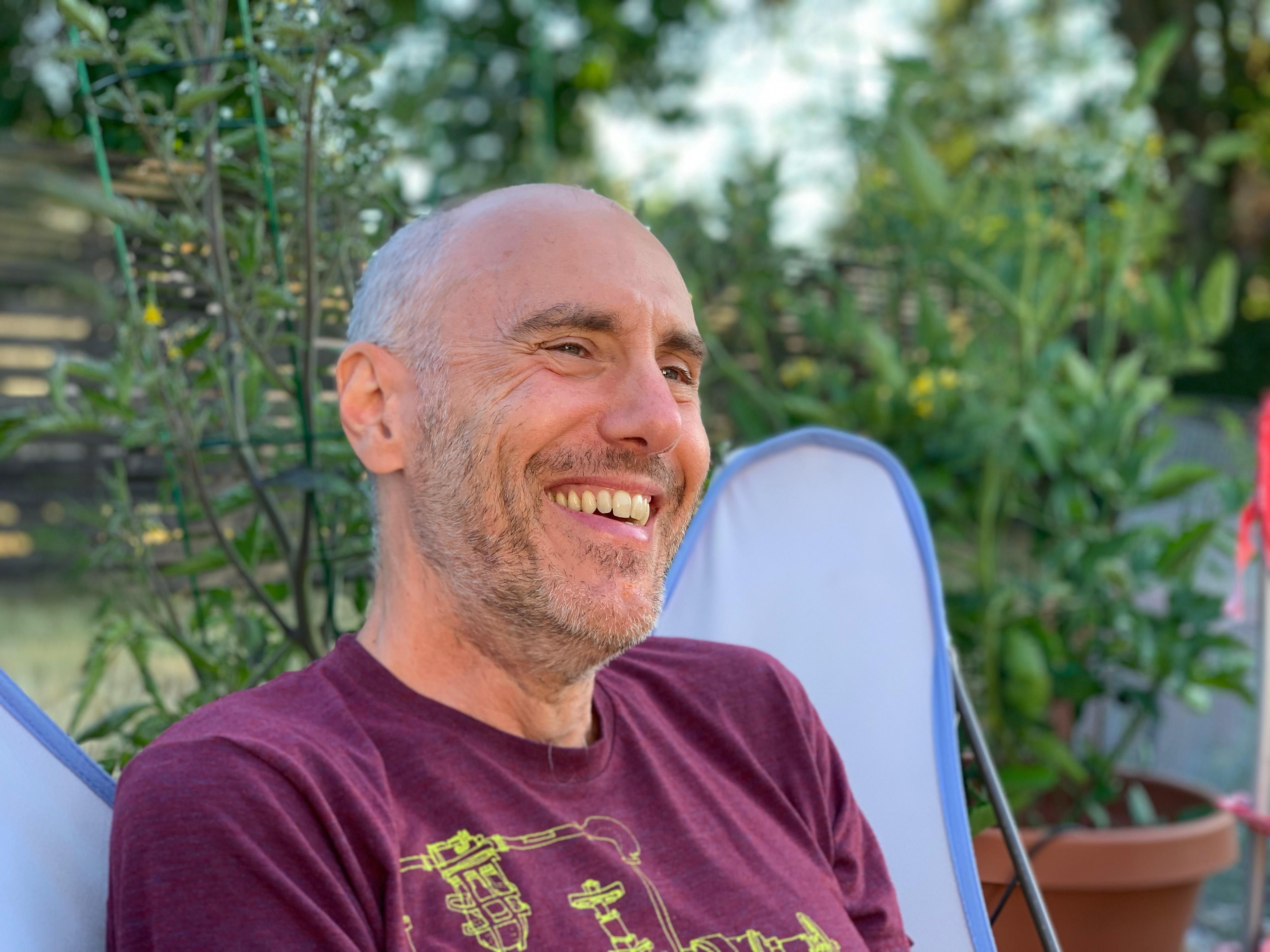Some people taste good. This is a fact. Flesh in the flavor of lemon meringue, expensive, organically sourced jerky, nachos where each chip’s been perfectly curated (bean, salsa, jalapeño, ooze of melted cheddar). Enough of these foods exist to render cannibalism moot, though fetishists, deviants, abound. A nibble too far (how many licks does it take to reach bone … ). Every so often the papers publish a gorging, which, thankfully, is inherently consensual because we all know a tasty person who doesn’t want to be eaten exudes a certain sourness (spoiled milk, rancid butter, cake taken from the trash frosting side down).
Synthetic humans are readily available too, that first edible sushi display turned phenom. You can buy a leg that tastes of banana, a breast like veggie lo-mein, a cheek done up like chocolate pudding, all manufactured and shiny in wax paper. Like marzipan fruit, only they are knuckles, toes, knee pits flavored like their predicated human source.
This isn’t an allegory or a metaphor, it’s real life.
Like people everywhere, we hate randomness, we want to know why one person tastes like Michelin-caliber Beef Wellington and another, plain human. (That bland, flavorless nothing.) And so, nature vs. nurture theories abound. One’s potential tastiness determined in no small part by: what a mother in utero eats; the father’s spunk; the amount of sun a pregnant belly receives; the nursery height relative to sea level; the amount of mold in the air on the third new moon; the color binky first sucked; the type of flooring in grandmama’s kitchen; the first grade teacher’s hairstyle; how far you make it in the spelling bee; one’s first masturbatory exploration; whether one enjoys gym class; and so on.
Because eventually we all ripen into who we will be (around age seventeen for most of us), and some of us taste like food and most of us taste like human, i.e., nothing. And what’s fair about that?
“Why do you care about all this?” my boyfriend Ryan asks me.
We’re at the table sucking the pits of cherries, eating the meat around the tiny stones.
Why shouldn’t I care? is what I think, but instead I say “I don’t care, not really. It’s just an observation. I’m allowed to observe, aren’t I?”
Ryan rolls his eyes and pulls me to him, kisses the stubble on my cheek, my flavoring, he likes to call it, cruel joke. “You taste like you and that’s why I love you.”
“You’d love me even more if I tasted like butter pecan.”
Ryan pulls away, pops a cherry into his mouth. “You’re wrong. You’re delectable just the way you are.”
And am I? Can it be true? I watch him pluck the pit from his mouth and place it with the others. Future trees, landfill fodder. “Well it’s not like I have a choice.”
Ryan sighs and reaches for another fruit. “But I chose you—isn’t that the point?”
I used to think I tasted like melon. After a long jog I’d lick my own salty shoulder, and the barest something would be on the tip of my tongue. I was nineteen then, past the point of ripening, but still holding out hope. I’m thirty-four now and still sometimes wonder whether I could bloom late. If anyone can.
Occasionally, weak-willed folks will hit up the Sephora, the Ulta, for the latest vanilla scent, a natural strawberry lip balm, or coconut body butter. Slather themselves up to feel sated, or so I’m told. The surgery route is still in experimental stages, and I’ve heard the outcomes can be dicey (patients asking to be fried chicken ending up as bland seitan and so on). Folks with less means have been known to hit the Kroger, the Food Lion, buy the meat rubs, the tenderizers and slather them on like tanning oil. But there’s no faking it. We all know a genuine from a pretender.
I’ve not been desperate enough to try these paths, though I’ve dreamed myself Raisin bran, chicken korma, hot dog, plenty of times. And when I wake up, the reality of my plainness flavors the day. All that I’m not, obscuring whatever it is that I am.
And so I’ve come to think any fakery would only underscore the absence. Pretending I’m someone I’m not, worse than the reality of being just me.
A sign of my maturity or the concession of not living out my dreams.
For my thirty-fifth birthday, Ryan tells me he’s cooked up something special. We’re drinking coffee in the kitchen. My birthday is a good two weeks away, and I think about asking why he’s giving me this hint when he knows it’s my nature to overthink—but then a wink and a kiss and he’s out the door, off to his job at the think tank where he researches energy efficient food production. It’s summer which means I’ve nowhere to be, school out of session, and my hours briefly my own.
I teach high school English. A career in education is one way to live vicariously through the burgeoning taste potential of our youth. Not a source of pain and envy as one might expect but a sobering. Because most of my charges wind up ordinary (occasionally inconsolably so) and who better to shepherd them through this realization than their teacher, the flavorless man.
Ryan appreciates my work as a teacher, suggests it’s healthy for me, exposure therapy, though I’m not always honest in my schadenfreude but who is?
Ryan and I met through an app three years ago, and we’ve been living together the last two. His profile on the app, though misleading, caught my attention.
I’m a sundae, I’m a banana split, devour me, please.
Hot fudge or caramel I’d replied, and he’d sent me an emoji of the shh face that confirmed my suspicions. It was all a joke, but it didn’t mean he didn’t want to be loved. Consumed is how he put it. I want to be everything to someone, in a healthy way of course.
And I knew what he meant. That was my dream too. To be everything. The main course. To be enough.
I finish my coffee and pick up my copy of Tender is the Flesh, and then I lie down by the window in the patch of sunlight to ferment, to waste away the day.
I learned the hard way not to date a taster (what they’re called colloquially). My ex, my first real love, was a grapefruit. Timothy. Smelled of sweet citrus, eternally sun-ripened and juicy with the tiniest hint of sourness to bring me back to earth. How many days lost to my nose pressed against his smooth chest, my teeth nibbling though never breaking flesh (he wouldn’t allow it)? How much weight I lost forgetting to eat because he was the only thing I desired?
We were so happy, I thought. He even allowed that I could be melon-esque, melon light. Kissing me and breathing me in and satiated by me alone. He loved me, I thought, the way that I loved him. Until one day.
“You’re obsessed,” he said to me. “You don’t even see me.”
“I see you plenty,” I said. “I love you more than real food. I love you more than Starbursts. I love you more than my mother for god’s sake!” I leaned in and kissed his shoulder, scraped the flesh just barely with my teeth. The faintest zest.
“But you don’t love me. You love that I’m a grapefruit. Do you know how alienating that feels? How humiliating? You don’t even know my favorite book, or movie, or pizza topping!”
It’s hard to be delicious. It’s not like I don’t understand that. (Though did I then? What was I able to admit?)
“But it’s so special what you are. Why can’t that be enough? I adore you! I worship you, peel and all.”
“But I’m Timothy. I’m me. And you, Aaron, are superficial.” You make me wish I was unflavored—did he say that or was it a dream? The way my yearning could make another person disavow their truest self.
We kept dating for another month or so, me pleading and pretending (badly) that I wasn’t who he knew me to be. But eventually he left me. Moved out. Is married now, to a man with terrible allergies, I’ve heard. Someone who rarely smells often can’t taste what’s right in front of him, but happier than me maybe. Probably? Both of them.
His husband richer in flavor than his wildest dreams—a Floridian grove, a California backyard—and yet all he sees is the man, just like any other.
The birthday arrives and it’s a weekday, a workday, so I have to wait until the evening for Ryan’s return. I’m watching television when I hear the key in the lock. On the couch drinking a club soda with a splash of cranberry juice, reclining, not in repose because I think that conjures a certain premeditation and I am myself when Ryan walks in with my surprise in tow.
“What’s this?” I ask.
Ryan, grinning, pushes a body in front of him, and immediately I’m overwhelmed. Kalamata olive. Tart. Specific. Oily but only just.
“This is Ken. Ken, meet Aaron, the birthday man.”
Ken smiles at me, dark-haired, semi-wrinkly, black button-down, loafers just perceptibly scuffed. “Aaron.” An unexpected deepness to his voice or pitted to be this way.
But my focus is on Ryan. Because I can admit it’s a fantasy (for who is it not?) but it’s never anything we’ve discussed in practical terms. “Hello, Ken?”
I make eyes toward the kitchen and Ryan, smiling, shakes his head. “An amuse bouche, baby. A little treat. Just enjoy it.”
Ken, awkwardly, joins me on the couch, a cushion apart. His olfactory a bit overpowering if I’m honest, but I’m drawn to him all the same.
How much of attraction is longing for who we ourselves wish to be? A brief eclipsing by the beauty and avowal of another. “And where did Ryan find you?”
“Would you like something to drink, Ken?”
Ken nods, asks for a beer, and Ryan slips away to the kitchen.
“An app?” I continue. “That would be the natural assumption.” (Edibles, a favorite, all the parameters and safe words mapped out in legal terms).
Ken shakes his head and a waft of brine comes my way. “No, actually. I work on the floor above Ryan. We’re elevator buddies.” He explains to me the path toward their acquaintanceship, the occasional coffee or lunch shared in the cafeteria, then Ryan’s confession of my obsession, his entreaty for this surprise, and Ken’s willingness to partake, his curiosity. “My girlfriend doesn’t like olives—that’s how I knew she really loved me. She won’t even nibble, unless it’s—you know. But I’ve always been curious about what it’d feel like.”
By the time Ken finishes speaking, I’m directly beside him, having moved ever closer subconsciously and now we’re thigh to thigh. He blushes slightly, and I think about the heart inside his chest like a vibrating pit. A little shaking stone.
“And your girlfriend doesn’t mind?”
Ken nods, earnest. “She knows I’m here.” Then a bashful shrug. “I think it turns her on.”
I take a swallow of my soda water. I want to ask him the questions I always want to ask—what’s it like to move through life in this way? Outwardly anointed, aromatically special? But I don’t want to fanboy him, and I worry maybe he’ll express what I don’t want to hear—what Timothy used to say to me: you get to be whoever you want, but I’m this way always, the first thing people notice. Maybe all they’re willing to notice.
“Are you afraid it’ll hurt?” The wrong thing to say but I’ve said it.
At some point, Ryan has reentered the room, and I sense his presence on the leather chair to my left, but I don’t turn to him. Don’t want to know what he’s thinking.
“You can smell that I’m not, right?” Ken says, and he takes a sip of beer and then leans toward me.
Our faces were close already and now they’re closer. Inches apart, really. I lean in ever so slightly. How it was with my first kiss with Timothy, an ever gradual coming together until we were one. (Or I was one with him and he was himself alone beside me.)
Ken rubs his cheek against mine, and Ryan exhales quietly, aroused or in awe. Consumption isn’t inherently sexual. Of course, for some it is, but not for me.
We nuzzle like cats, Ken and I, like animals, like mother and child.
My eyes are closed. I press my forehead to Ken’s neck, my lips making first contact, the hint of my tongue on his collarbone and it’s Greek salad, it’s antipasti, it’s heaven. I don’t bite, just press my mouth, and his thin skin drugs me with its heady tang.
“Where should I bite?” I whisper into his ear.
Ken’s fingers in my hair, he moves his lips to my cheek and whispers back, “Here. Just a little bite. Just be gentle.” Then he takes my hand and places it on his shoulder. Taps my finger on the bicep. But before I can bite, he holds my chin in his hand, makes me look at him.
“No one has ever seen me so clearly, Aaron. I can sense it.”
Once and only once Timothy let me take a bite. This was on our second anniversary, after dinner at the fanciest restaurant we’d ever been to together—suits, caviar, bowl-sized glasses of Barolo. We took a car home, and he lay his head on my shoulder. I know you’re still hungry, he said to me. Though I wish you weren’t.
Back in the apartment he fashioned us cocktails, gin, chartreuse, splash of soda.
What is it that makes you so fascinated by us tasters? He asked me and not for the first time, but this time, I tried to answer him.
I don’t know. I guess. To be so completely something. Obvious, definable, true?
That makes me sad, Aaron, you know why?
I didn’t but I held him, pulled him close because I did love him. I did.
You think I’m a grapefruit, but I’m not.
And then he unbuttoned his shirt and lifted the hem. And then, what? What do I remember?
This was around the time I had a student, Alice, who had woken up to discover she was a croque monsieur. The smell so pervasive, she threw up a little, she told me. Crying in my classroom. You’ll get used to it, I promised her. This is big, this is special. You can do anything! What I wouldn’t give to be you, and she looked at me, her tears salty, probably also a little sweet. What if I’m still not enough?
In the bedroom, I put my teeth on Timothy’s belly, and though he tried his best not to be—he was terrified, and the foulness of the rotten fruit, its spoil was all I could taste.
Though, I didn’t spit him out. I held him in my mouth. Pressed my palm against the tiny blip of blood, and he cried against me, into my ecstatic embrace. What I could not hide.
I want to tell you that Ken was mealy. Unspecial. A kalamata from a cheap jar forgotten on the grocery store’s lowest shelf, rancid and not at all buttery, but that’s not true. Ken was a decent olive. Not the best I’ve ever tasted, but not the worst either. (Despite the ow ow ow that punctuated my tiny, albeit painful, bite).
Afterward as I chewed the little morsel of olive-flavored flesh, while Ryan attended to the pea-sized wound with antiseptic, gauze, a band-aid, Ken droned on excited, drunk-seeming though he’d had the one beer. Likely high on the drama, the attention. “Wow wow wow! That was—incredible!” and he waxed on about the feeling of it, not just pain but something greater, rapture? Importance? He left shortly after (though not soon enough) to report back to his girlfriend and so it was me and Ryan alone in the living room.
“Let me taste you. I mean, why not? You got your turn.”
I study Ryan, his not-so-neat beard, his skinny neck, his bright, wholesome eyes. “But I’m just me? And you’ve never shown interest.”
“Not melon?” he winks and I feel something then, a tremor or a vibration.
“All right.”
Then he’s beside me, this newest love of mine, partner, and friend. He whispers where? and I tap my forearm, the fleshy, muscly part and he nods. I smell him next to me, breathe him in—the soap we share, the titch of sweat, that warm baked-pizza mouth-breath that made me first love him. Whatever the inside of him is that I only rarely get to partake in. Then the flesh of me in his mouth.
“Does it hurt?”
“No,” I tell him. “Dig in.”
Flesh, blood, veins, fat, skin. And how is it, I long to ask.
“You’re disgusting,” he says to me. “You’re everything I want.”
You’re you.
Rebecca Bernard
Rebecca Bernard is the author of the story collection Our Sister Who Will Not Die (Mad Creek Books, 2022). Her fiction has most recently appeared or is forthcoming in Oxford American, Alaska Quarterly Review, The Cincinnati Review, and Southern Indiana Review. She is an Assistant Professor of English at East Carolina University, and she serves as a fiction editor for The Boiler and the North Carolina Literary Review. Find her at rebeccaibernard.com








